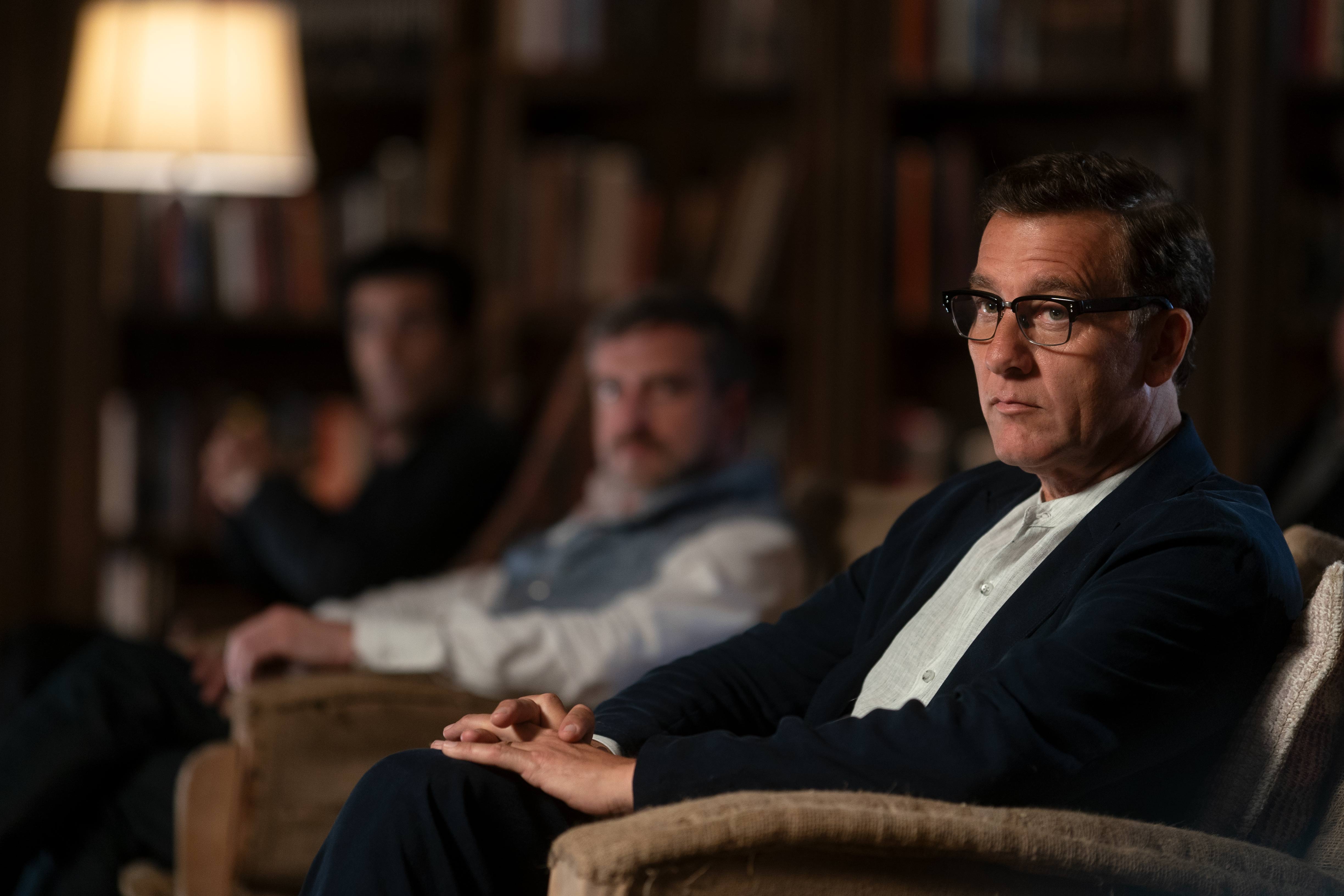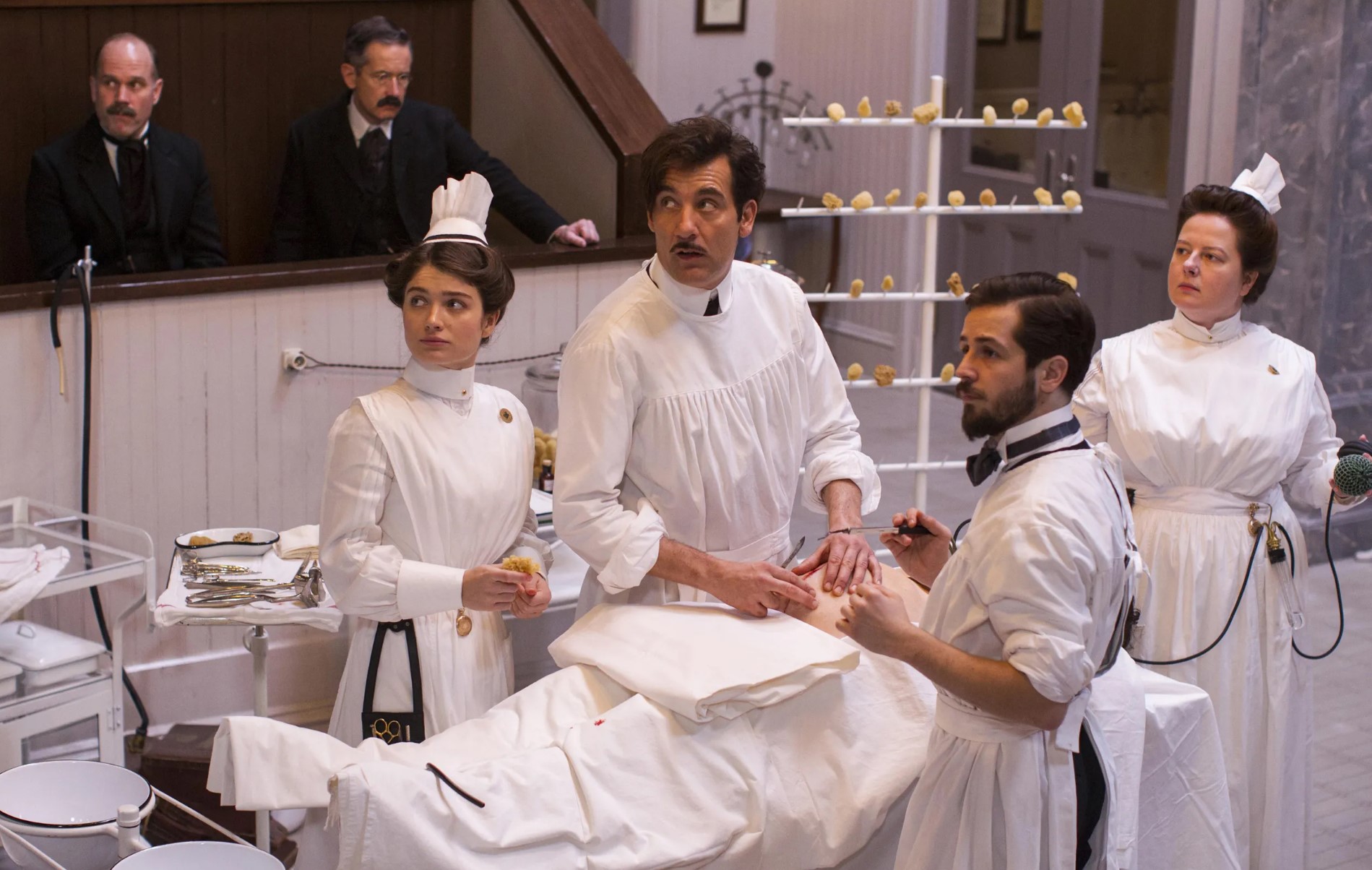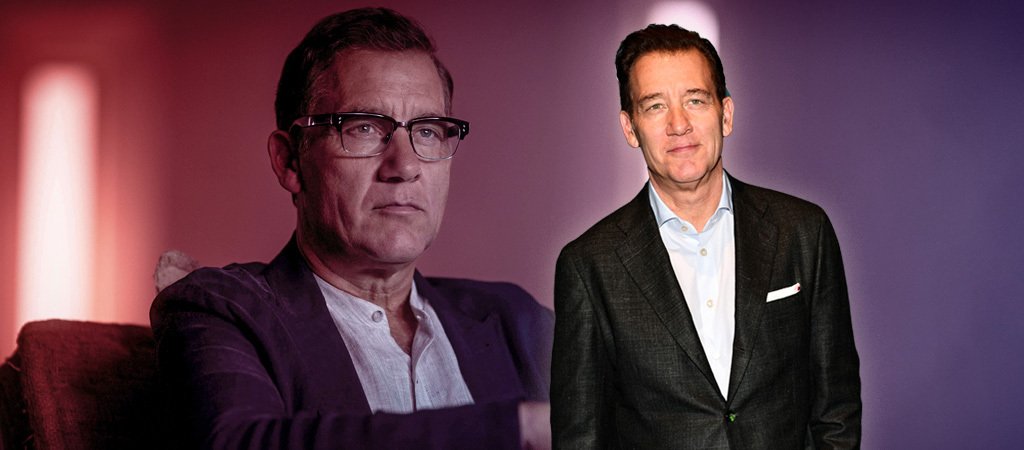On the surface, A Murder At The End Of The World scans like a more serious-minded version of Glass Onion, but it’s something else, with complex family dynamics, lost love, and tech futurism mixed into a slow-burn murder mystery set in the alien confines of snow covered Iceland. The players? A wildly successful and mildly suspicious band of thinkers, the seemingly shady suspect #1 in the ambitious tech billionaire (Clive Owen) who brought the attendees to the “end of the world,” and the show’s very own Benoit Blanc: a young genius amateur sleuth named Darby (Emma Corrin) who provides the show with its POV and power.
Consider Owen a fan. In the interview below, the actor makes it clear that the whodunnit genre was in need of the fresh perspective that Darby brings through Corrin’s awesome performance, lauding the creative choice of centering the show around a Gen-Z woman and talking about how his character is both intimidated by and drawn to Darby’s intelligence, curiosity, and independence.
A veteran of the mystery genre (Gosford Park) and an icon of screens big (Children Of Men, Closer) and small (The Knick), Owen leans into risk-taking as a litmus test for the roles he’s offered, telling us, “I don’t like to play it safe.” We talk a bit about that operating principle, how he defines success, and not judging his younger self too harshly, before offering a quick thought on whether a return to The Knick would ruin the previous finale or even be of interest to him should a continuation series make it to the screen.
What it is about this character that was so compelling to you and made you want to sign on for this, go to Iceland, go through this entire adventure?
I really like Brit Marling and Zal Batmanglij and I was a really big fan of The Oa, and I think they’re very kind of ambitious writer/directors that are really reaching out and trying to do interesting, unsafe projects really. They’re bold and that was a big attraction.
It was sort of pitched as a modern murder mystery and I, back in the day, did Gosford Park which was, if you look at it as a group of people held captive in one place and something goes on. But this, I felt, was a really fresh take. Not only the subject matter — we’re in the world of tech and AI and the world in which this thing is inhabiting felt very modern and relevant, but also the fact that Emma Corrin’s character of Darby is young, super smart, a very savvy female taking us through it; that feels very of the moment. And it made you realize that we’ve seen many, many murder mystery movies, but we haven’t seen enough young females who are smart (within that genre) and we should. It was a big attraction to me. I haven’t seen this. I haven’t seen a character like this take us through one of these stories before and I liked it. I thought it was fresh and alive.
In terms of the hierarchy when you’re presented with a project, is that riskiness, that danger, and that need to be something you haven’t seen before of foremost importance?
It’s always hugely exciting. I suppose I’ve always been that person who likes to sort of push it and have a look at things. I’m always attracted to projects that I think do that. I’m quite fearless in that way. I don’t like to play it safe. I don’t like to repeat things. I don’t like finding something that I think, “Oh, I’m good at that and I’ll just keep repeating that.” I’m always going, “Let’s risk it. Let’s try this.”
I mean, if I look back through my whole career, really, it’s full of taking a step out and deep down I say, “What’s the worst thing that can happen? That I’ll be bad in it? I’ve been bad before. I’ll be bad again.” But that’s where you learn to get better.
How important is it to be able to stand up and say, “This is the career I want, this is the career I’ve wanted?” I compare it to swimming against the current as opposed to just floating in the ocean. How important is that to you and when did that become important? Because obviously, as a younger actor, one can’t be as choosy.
I do think acting, like lots of other professions, is all about you creating yourself some space, you get some traction for something and then how do you use that? What are your decisions then? That’s the crucial time. You do a film that opens things up for you, or you do a project that people suddenly are looking at you and the potential there and you’re suddenly given choice. Now, what are your choices? That’s a crucial time, and that’s where you decide what kind of career and what kind of life you want, really.
I’ve trained in the theater even though I would say that now film and TV is probably my first love. But because I trained in the theater, it’s all about playing different parts. It’s all about stretching yourself in different ways. That’s how you learn. That’s how you grow. That kind of risk-taking is the most exhilarating, exciting thing. There’s nothing more boring than if you just find something you’re good at and keep repeating.
What allowed TV and film to sort of jump up a level and become your first love versus theater?
Weirdly, I think, I just love the community of making a film. I love the fact that it’s kind of out of everybody’s control, that you can have the best director, the best DP, the best actors, and still put out something that’s not very good. I find that fascinating that it’s the combination of things and the combination of talents. I get as thrilled meeting and coming across a brilliant props guy as I do another great actor. I love when people are great at what they do and actors, they have much more control in the theater. They edit their own performance. They dictate the rhythm of everything. But I love the fact that the film is just sort of a coming together of lots and lots of… There’s something elusive about it, and I’m just super comfortable on a film set, more so than I am in the theater these days.
How do you define whether something is a success or not for you?
If I like it.
It doesn’t have anything to do, obviously, with success, failure, or box office, I would imagine?
No, it’s if I like it. I’ve done plenty of things that have done okay that I’m so-so about. I’ve done plenty of things where it hasn’t done very well, but I’m very proud of it. I think if I go in there and it is close to the reason that I wanted to do it in the first place. Even if it doesn’t hit and doesn’t become the big success that everyone hopes. I’ve noticed as well with certain things in my career that things sometimes take their time, that they might come out and not get the heat that people were hoping or expecting. Then, over time, they stick around and it becomes something that stands the test of time. I’ve seen that a few times. I think that often you can get caught up in what is really, really hot and then three years later you won’t even think about that particular film. (Laughs)

That’s very true. Are you someone who is sort of a rigorous investigator of your own past performances? Do you look back and judge yourself or try to figure out what went wrong?
No, no, no, I’d never do that. No, I hardly look at myself at all. But I did have a strange experience a year or two ago. A really good, really close friend who sadly passed away, Mike Hodges, who directed a film that was hugely important in my career called Croupier, which was a small film, but kind of opened doors for me in America and sort of got the whole film thing going. They had a big retrospective at the National Film Theater and they screened Croupier, and I went and introduced it for Mike, and I watched that film for the first time in about 20 years. I love what Mike did in it, but I could see a young, naive actor [referring to himself] who made some choices that I definitely wouldn’t do now. (Laughs) But that’s not to say they weren’t the right choice for that guy at that time. That film did an awful lot of good for me. So whoever that actor was, it did me okay.
Taking this back to the show in terms of who the character is, obviously a tech billionaire, highly innovative, highly ambitious. There are some other aspects. Are you someone who is fascinated by these tech billionaires in real life and the sway that they have over society and did you look into that when preparing for this?
I mean, I looked at them. We can see clearly the sort of inspiration for a character like that. I didn’t do the thing of honing in on somebody and going, “That’s who I’m going to base it on.” I was very much led by talking to Brit and Zal and the script and doing that. But it is fascinating, the influence and the power really. But similarly, people who are at the forefront of social media and how that’s used, we are in a sort of time where information is spread in a really fast, complex way. If people get ahead of that curve, it can be extremely powerful.
Similarly, AI features heavily in this, and we’ve just seen the actors’ strike go on for some time with AI being a central thing that they’re trying to get on top of. It’s hugely important because the potential there is so enormous, probably outside of our grasp at the moment of what the real potential of it is. But if you slip behind that, I think you’ll end up years chasing it. So it was hugely important to address it and start looking at it and start getting protection from it. I think the interesting thing about those guys at the front of these massive tech companies is that they’re kind of ahead of the curve because they can see what’s coming.
I’m curious about Andy’s relationship to Emma’s character, Darby. What is it about her character that fascinates him and what is it about her character that scares him? Because I feel like of all the interactions she seems to be someone who does spook him a little bit.
Yeah, I think the answer to both questions is that she’s very smart and I think he’s attracted to that and very wary of that as well. I think he sees quite early that she could be a threat but, at the same time, I think he’s impressed by her smarts and her intelligence.
She seems like the character who needs him least in the room also.
For sure, for sure. And because of that, (she) is a threat and that’s why at some point he pulls her close and then enlists her help and puts her in the position of an ally because he can tell otherwise she could be quite a threat.
Definitely a threat, but also is that partly appealing to him because of the fact that obviously when you’re in that position, you’re going to be surrounded by sycophants and people that just have their hand out?
No question. No question. We all know when we’ve met really powerful people, they’re not attracted to the sycophants and the ones that sort of do the same as everybody else. They’re always pulled to the people who hold themselves in a different way.

As you said, you don’t like to jump back into things that you’ve already done and play the same part over and over again. I thought The Knick was tremendous. I thought the ending of The Knick was fantastic. There’s been some talk about bringing it back with André Holland’s character and setting it differently. I’m just curious if you feel like one can ruin a good ending by going back to the well too many times.
I don’t know if it’s about ruin. I had one of the best times. That was just such a sublime piece of writing. Soderbergh was on just amazing form, and the whole experience was an absolute joy and I absolutely adored it, but I was always going in for two seasons and he sort of told me he knew how he wanted to leave it with me, and he told me that off the bat. So it was kind of perfect in its sort of shape really that. So it’s not something that I would want to go back to, really.
The first two episodes of ‘A Murder At The End Of The World’ are available to stream on FX On Hulu with new episodes dropping every Tuesday.







